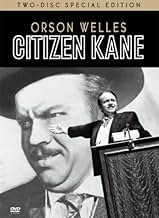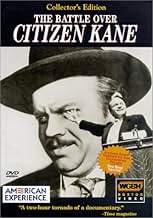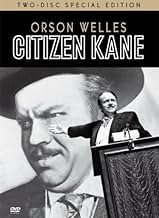The Battle Over Citizen Kane
- Folge lief am 30. Juni 1996
- 1 Std. 48 Min.
IMDb-BEWERTUNG
7,7/10
1482
IHRE BEWERTUNG
Füge eine Handlung in deiner Sprache hinzuDocumentary about the battle between Orson Welles and William Randolph Hearst over Welles' Citizen Kane (1941). Features interviews with Welles' and Hearst's co-workers also as a relative co... Alles lesenDocumentary about the battle between Orson Welles and William Randolph Hearst over Welles' Citizen Kane (1941). Features interviews with Welles' and Hearst's co-workers also as a relative complete bio of Hearst.Documentary about the battle between Orson Welles and William Randolph Hearst over Welles' Citizen Kane (1941). Features interviews with Welles' and Hearst's co-workers also as a relative complete bio of Hearst.
- Regie
- Drehbuch
- Hauptbesetzung
- Für 1 Oscar nominiert
- 2 Nominierungen insgesamt
Richard Ben Cramer
- Narrator
- (Synchronisation)
Marion Davies
- Self
- (Archivfilmmaterial)
William Randolph Hearst
- Self
- (Archivfilmmaterial)
Empfohlene Bewertungen
There have been said so many things about Citizen Kane and how it was made .. but this is not just about that. It is about the two figures this movie is sort of about. So we don't just get the backstory on Welles but also on Hearst. This is an episode of a show and as far as I know the only one I've watched of that show. And only because it was on the box set of Citizen Kane I have aquired (which I can highly recommend by the way).
If you are a fan of the movie and many are! While it is old and in black and white, it has not aged at all. It really holds up so good, you can watch it multiple times and discover new things every time. About the characters, about the dialog, about costumes and set design ... now those things are not so much topic of this documentary. There are other behind the scenes documentaries for that. And it's good it concentrates on the two as it does. And while I was aware of the radio show that riled up Americans (about an alien invasion - talk about pranks), there were still things to discover or at least hear from Welles and others who were affected.
Overall a very fine documentary, which may come off as dry for some, but has a lot of gems in it too.
If you are a fan of the movie and many are! While it is old and in black and white, it has not aged at all. It really holds up so good, you can watch it multiple times and discover new things every time. About the characters, about the dialog, about costumes and set design ... now those things are not so much topic of this documentary. There are other behind the scenes documentaries for that. And it's good it concentrates on the two as it does. And while I was aware of the radio show that riled up Americans (about an alien invasion - talk about pranks), there were still things to discover or at least hear from Welles and others who were affected.
Overall a very fine documentary, which may come off as dry for some, but has a lot of gems in it too.
Documentary about the battle between Orson Welles and William Randolph Hearst over Welles' "Citizen Kane" (1941). Features interviews with Welles' and Hearst's co-workers also as a relatively complete bio of Hearst.
This documentary covers two things. One is the creation of "Citizen Kane" and the troubles that Orson Welles went through to get people to see it. This is covered fairly well, and for a fictional version of the story people can watch "RKO 281" which is based on this documentary.
The other part is just as interesting, and maybe even more so: the biography of William Randolph Heart. While a towering figure in his day and at the time "Citizen Kane" came out, he has left the public consciousness. Do half of the people in America even know who he is? Probably not. And yet he had a profound effect on journalism and culture. He should be celebrated.
This documentary covers two things. One is the creation of "Citizen Kane" and the troubles that Orson Welles went through to get people to see it. This is covered fairly well, and for a fictional version of the story people can watch "RKO 281" which is based on this documentary.
The other part is just as interesting, and maybe even more so: the biography of William Randolph Heart. While a towering figure in his day and at the time "Citizen Kane" came out, he has left the public consciousness. Do half of the people in America even know who he is? Probably not. And yet he had a profound effect on journalism and culture. He should be celebrated.
In the middle of the landmark masterpiece film "Citizen Kane", Leland (Joseph Cotton) criticizes Kane (Orson Welles) about his out-dated political views after Kane has lost an election. Leland states that Kane views himself as a kind of benevolent monarch that has the power to bestow rights on the "working man". Leland furthers his argument to say that Kane ultimately thinks he owns "the people". Leland concludes that "the people" will demand their rights removed from any "gifts" of moneyed magnates. The essence of this scene in "Kane" is what "The Battle for Citizen Kane" is all about. Here, possibly for the first time, politics is critiqued by "entertainment". Welles dared to portray in an unfavorable light one of the most powerful men in the US at that time: William Randolf Hearst.
Sometimes truth is stranger than fiction. The truth of Citizen Kane, as hypothesized by "The Battle for Citizen Kane" is that Charles Foster Kane, the "protagonist" of Welles' movie, was not purely William Randolf Hearst. He had a little of Orson Welles in him. Whether intentional or purely coincidental, the character portrayed by Welles was much more rooted in Welles own biography than most people realize, and the end of his life was strangely predicted by the movie. This film is about the two men that gave birth to the film character "Charles Foster Kane". It is also one of the best commentaries on the movie industry of the early 20th century.
The movie "Citizen Kane" was not only one of the earliest examples where the entertainment industry made a caustic criticism of politics. It also makes commentary on the entertainment industry itself. Often the general public sees the entertainment industry as just that: an industry presenting escapist material for consumption during leisure hours. What the public doesn't see is how intertwined the entertainment industry is with politics, and how the industry often resists making critiques of politicians when it might jeopardize its own self-interests. This documentary centers around how a movie made in 1940 challenged a living political tycoon. "Citizen Kane" was and still is one of only a handful of narrative feature films that dared to portray a living political force. A couple of others that come to mind are "All the President's Men" (made after Nixon and his top advisers had lost their power) and recently "The Queen", concerning Queen Elizabeth II, still the current monarch of England.
Hearst was a 19th-century newspaper magnate who resisted the progressive values of the early 20th century that began to object to the monopolized power of corporate magnates. Hearst began using his newspaper for political means and began blurring entertainment and news almost a century before Fox News appeared on cable television.
Thousands of people made Hearst newspapers function, and millions of readers depended upon Hearst and his publications for honest reporting, and Hearst depended upon those readers to maintain his business. However, Hearst categorically discredited these kinds of realities. The newspapers were ultimately his and his alone, a very 19th-century view of business. And he could use and abuse his newspaper to propagate any agenda he wished. For Hearst, the fact that the public paid for his newspapers, and therefore paid for his livelihood, was irrelevant. For a young filmmaker just given "carte Blanche" in Hollywood, Hearst was the perfect subject-matter for a film project that would depict the American dream gone corrupt. Orson Welles was possibly the first director that had the backing of a major Hollywood studio to not only portray but critique the motives and integrity of a living political magnate through the means of cinema.
As great a filmmaker as Welles turned out to be, he was too young and inexperienced to understand the power of political and moneyed magnates. Welles was not just playing with dynamite-- he was playing with nuclear weapons. Welles was certainly naive if he thought Hearst was going to take such abuse without fighting back. Hearst did not just fight back, he declared war. The documentary chronicles that war, from the copy of the script that is secretly obtained by a Hearst insider to Hearst's threats to boycott the studios' movie ads. The documentary has it all. It includes superb biographies of both men chronicling the time before their lives dramatically and traumatically intersected. One other unique aspect of the documentary is its use of the film "Citizen Kane" to show aspects of the character Kane that belonged to Hearst and alternate aspects that belonged to Welles.
It appears fitting that the only two figures that could match a fictional character like Charles Foster Kane would be William Randolf Hearst and Orson Welles. Ironically, Welles and Hearst created Kane, and Kane changed Welles and Hearst forever after like no other single character in cinematic history. Kane became the Frankenstein's monster that ended up outdoing its creators. Cinema buffs will largely see Hearst as Kane portrayed by Welles--from the young newspaper owner/editor trying to establish a reputation for quality journalism to the corrupt media magnate using his newspapers to push his second wife into entertainment stardom. And Welles would never live down Kane as his first, best and greatest achievement in the entertainment industry. Some in the industry joked that Welles was the biggest has-been in Hollywood at the ripe-old-age of 26 after the completion of "Kane". Welles would certainly make contributions to the field after Kane, but he would never top it, as predicted by a veteran Hollywood journalist at the time. The "Battle for Citizen Kane" portrays one of the strangest triangle of characters ever assembled. And as the film points out, the movie "Citizen Kane" is the one "character" that appears to have had and continues to have a happy ending.
Sometimes truth is stranger than fiction. The truth of Citizen Kane, as hypothesized by "The Battle for Citizen Kane" is that Charles Foster Kane, the "protagonist" of Welles' movie, was not purely William Randolf Hearst. He had a little of Orson Welles in him. Whether intentional or purely coincidental, the character portrayed by Welles was much more rooted in Welles own biography than most people realize, and the end of his life was strangely predicted by the movie. This film is about the two men that gave birth to the film character "Charles Foster Kane". It is also one of the best commentaries on the movie industry of the early 20th century.
The movie "Citizen Kane" was not only one of the earliest examples where the entertainment industry made a caustic criticism of politics. It also makes commentary on the entertainment industry itself. Often the general public sees the entertainment industry as just that: an industry presenting escapist material for consumption during leisure hours. What the public doesn't see is how intertwined the entertainment industry is with politics, and how the industry often resists making critiques of politicians when it might jeopardize its own self-interests. This documentary centers around how a movie made in 1940 challenged a living political tycoon. "Citizen Kane" was and still is one of only a handful of narrative feature films that dared to portray a living political force. A couple of others that come to mind are "All the President's Men" (made after Nixon and his top advisers had lost their power) and recently "The Queen", concerning Queen Elizabeth II, still the current monarch of England.
Hearst was a 19th-century newspaper magnate who resisted the progressive values of the early 20th century that began to object to the monopolized power of corporate magnates. Hearst began using his newspaper for political means and began blurring entertainment and news almost a century before Fox News appeared on cable television.
Thousands of people made Hearst newspapers function, and millions of readers depended upon Hearst and his publications for honest reporting, and Hearst depended upon those readers to maintain his business. However, Hearst categorically discredited these kinds of realities. The newspapers were ultimately his and his alone, a very 19th-century view of business. And he could use and abuse his newspaper to propagate any agenda he wished. For Hearst, the fact that the public paid for his newspapers, and therefore paid for his livelihood, was irrelevant. For a young filmmaker just given "carte Blanche" in Hollywood, Hearst was the perfect subject-matter for a film project that would depict the American dream gone corrupt. Orson Welles was possibly the first director that had the backing of a major Hollywood studio to not only portray but critique the motives and integrity of a living political magnate through the means of cinema.
As great a filmmaker as Welles turned out to be, he was too young and inexperienced to understand the power of political and moneyed magnates. Welles was not just playing with dynamite-- he was playing with nuclear weapons. Welles was certainly naive if he thought Hearst was going to take such abuse without fighting back. Hearst did not just fight back, he declared war. The documentary chronicles that war, from the copy of the script that is secretly obtained by a Hearst insider to Hearst's threats to boycott the studios' movie ads. The documentary has it all. It includes superb biographies of both men chronicling the time before their lives dramatically and traumatically intersected. One other unique aspect of the documentary is its use of the film "Citizen Kane" to show aspects of the character Kane that belonged to Hearst and alternate aspects that belonged to Welles.
It appears fitting that the only two figures that could match a fictional character like Charles Foster Kane would be William Randolf Hearst and Orson Welles. Ironically, Welles and Hearst created Kane, and Kane changed Welles and Hearst forever after like no other single character in cinematic history. Kane became the Frankenstein's monster that ended up outdoing its creators. Cinema buffs will largely see Hearst as Kane portrayed by Welles--from the young newspaper owner/editor trying to establish a reputation for quality journalism to the corrupt media magnate using his newspapers to push his second wife into entertainment stardom. And Welles would never live down Kane as his first, best and greatest achievement in the entertainment industry. Some in the industry joked that Welles was the biggest has-been in Hollywood at the ripe-old-age of 26 after the completion of "Kane". Welles would certainly make contributions to the field after Kane, but he would never top it, as predicted by a veteran Hollywood journalist at the time. The "Battle for Citizen Kane" portrays one of the strangest triangle of characters ever assembled. And as the film points out, the movie "Citizen Kane" is the one "character" that appears to have had and continues to have a happy ending.
This is a feature-length documentary found on the DVD of Citizen Kane(not to be confused with the actual TV picture of a few years later, RKO 281, in spite of the latter sharing the title and evidently at least some of the premise). It's well-produced throughout and leaves little to be desired. It is more about the life and accomplishments of Hearst than Welles, but that can be argued as fitting, as that was whom the film in question was intended to be a biography of(if it turned out to be a bit of a misunderstood attempt at so, masterful effort though it is, and in the end actually is closer to the real persona, past and then-future of its maker). We are given a lot of insight into both of them, who they were, what drove them, their triumphs and defeat. It's all told rather well, with clips of the movie itself(as well as others, where it fits), interviews, past as well as current, with those who worked with them(and even one of Orson himself, from '82), footage from behind the scenes, stills and narration. A number of the many shocks the two caused, including the (in)famous War of the Worlds broadcast, are detailed, with witness accounts where possible. It's well-written and put together with expertise. This alone ought to be a strong point in favor of owning a copy of the piece itself. I recommend this to anyone who wants to know about one and/or the other of the mighty people, the controversy and their clash. 8/10
Feature length documentary on the life of Orson Welles and William Randolph Hearst. The making of the film Citizen Kane, the controversy it had, and the battle between Hearst and Welles, with Hearst trying his best to make sure the film never was released. Very Interesting, never dull, and with some bits of trivia about the movie that isn't that well known. *** out of ****
Wusstest du schon
- WissenswertesThis documentary was the basis for Citizen Kane - Die Hollywood-Legende (1999) which chronicles the origin and making of Mercury's production of Citizen Kane (1941).
- VerbindungenFeatures 25th Infantry (1900)
Top-Auswahl
Melde dich zum Bewerten an und greife auf die Watchlist für personalisierte Empfehlungen zu.
Details
- Laufzeit1 Stunde 48 Minuten
- Farbe
- Sound-Mix
- Seitenverhältnis
- 1.85 : 1
Zu dieser Seite beitragen
Bearbeitung vorschlagen oder fehlenden Inhalt hinzufügen

















